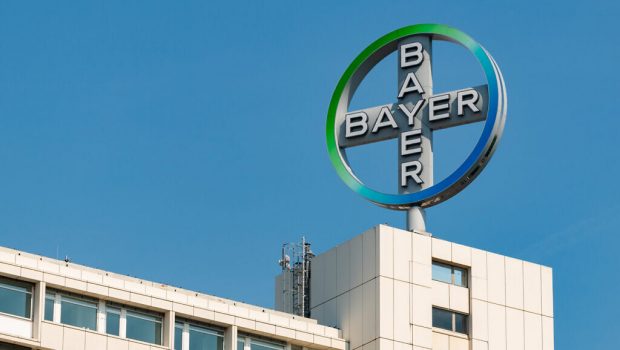Pharma giant Bayer to set up cybersecurity center in Israel
Pharmaceutical giant Bayer will open a cybersecurity development center in Israel, as part of the German multinational’s global cybersecurity operations, in a bid to engage and partner with one of the strongest Israeli sectors in the local tech ecosystem.
Hugo Hagen, the managing director and country division head of Bayer Israel, made the announcement Wednesday together with the Ministry of Economy and Industry, following the visit to Israel this week of a delegation of senior Bayer executives.
Israel is currently hosting the Cyber Week conference at Tel Aviv University, an annual cybersecurity summit that draws government officials, intelligence authorities, and entrepreneurs and executives from all over the world. Both outgoing Prime Minister Naftali Bennett and Defense Minister Benny Gantz spoke at the conference this year, warning that the cyber sphere was the most prominent dimension of future warfare, including attacks on critical infrastructure such as energy, water and manufacturing, and supply chain operations.
Israel is a cybersecurity powerhouse with companies in the sector raising a record $8.8 billion in 2021, a figure that accounts for 40% of the total funds raised by cybersecurity firms worldwide last year, according to data provided by the Israel National Cyber Directorate.
Overall cybersecurity exports from Israel were estimated at $11 billion in 2021, according to separate Israeli Export Institute data.
A number of multinationals have opened cybersecurity centers in Israel including Mastercard, Japanese IT multinational Fujitsu, Anheuser-Busch InBev (AB InBev), the world’s largest beer maker, and multinational consulting firm PricewaterhouseCoopers.
For Bayer, Hagen said in a statement Wednesday: “As a company engaged in R&D in the core areas of life sciences, the ability to integrate with Israel’s unique cybersecurity ecosystem, alongside sectors such as medical innovation and agricultural development is an opportunity to integrate as players in the Israeli market and provide added value for Bayer and for the ecosystem.”
Hugo Hagen, the managing director and country division head of Bayer Israel (Danit Nitzan)
Biotech and pharmaceutical companies are highly susceptible to cyberattacks, according to experts. In 2017, pharmaceutical giant Merck was one of the high-profile corporate victims of one of the worst, most destructive cyberattacks in the world, NotPetya, a “wiper” malware attributed to Russia. The infection spread across the world from hospitals to shops to banking multinationals, huge corporations, and manufacturers, and cost billions of dollars in losses.
Bayer’s cybersecurity center will operate in Bayer Israel’s existing offices in the central city of Hod Hasharon, and will work to create collaborations with Israeli cybersecurity startups and companies.
The new center will be one of Bayer’s largest internal cyber units, the Ministry of Economy indicated.
The ministry’s director-general, Dr. Ron Malka, said Israel was a major draw for multinational companies “and there is no doubt that such connections contribute to employment, innovation, [and] Israel’s image and attract other international investments.”
Malka welcomed Bayer’s expansion in Israel and said the ministry was working to create “similar connections in the future.”
Bayer — the inventor of aspirin and the maker of over-the-counter commercial products such as Claritin, Alka-Seltzer and Aleve, as well as prescription cancer medication Nexavar — has been active in Israel since 2008, and has been tapping into local opportunities in both the pharmaceutical field and the agricultural tech sector. The company invested in plant genomics firm Evogene in 2010; in Compugen Ltd., a cancer immunotherapy firm in 2013; and in drip irrigation developer Netafim in 2016.

Headquarters of Bayer AG in Leverkusen, Germany (Courtesy)
In 2016, Bayer set up an agricultural innovation fund together with the Trendlines Group, an investment company, to treat bacterial diseases in crops, and has partnered with Israeli biotechnology incubator FutuRx to foster startups focused on innovative therapeutic technologies.
The firm also collaborates with Prospera Technologies to improve agriculture output using the AI and advanced data collecting methods developed by the Israeli startup.
In 2019, a delegation of 15 senior officials of Bayer visited Israel to seek out partnerships and investment opportunities in local startups in the field of biotechnology and digital health. Similar visits had been held until then only in countries considered among the leaders in the field of biotech, pharma and digital innovation, including Germany, China and the United States.

The Bayer delegation in Israel, June 29, 2022 with director-general of the Ministry of Economy and Industry Dr. Ron Malka. (Gideon Sharon/ Ministry of Economy and Industry)
Hagen himself has been in Israel since 2019, scouting for Israeli technologies in the fields of pharma, agriculture and digital health technologies for the 150-year-old life sciences German-based firm Bayer AG, one of the largest in the world by sales.
In an interview with The Times of Israel last year, Hagen said his job was to “ping” managers at the HQ about what is going on in the local ecosystem, alerting them about the latest developments. Competition to find the next big thing in Israel is high.
“There are so many companies scouting for those good ideas,” he said. “If there is an Israeli company with good phase II (clinical trial) data, I’ll promise you it is on the radar already of many pharma companies.”
Last year, Bayer’s investment arm, Leaps, invested in Israel-founded biotech firm Ukko, which raised a total of $40 million from investors in a series B funding round to use artificial intelligence and protein engineering to develop healthier food and therapies for food allergies.
Bayer also signed a collaboration agreement last June to test out new drugs on human heart tissue 3D-printed by researchers at Tel Aviv University.
But the German multinational has yet to make any acquisitions of Israeli firms and has faced a period of unprecedented turbulence following its 2016 purchase of US agritech firm Monsanto for $66 billion. Along with the company, Bayer acquired what turned out to be over $10 billion in lawsuit settlements stemming from the use of Monsanto’s weed-killer Roundup, which allegedly causes cancer. Its market capitalization dropped from a high of $116.8 billion in 2017 to just $46.1 billion in late 2020. It has since recovered to about $63 billion as of June 2022.
Shoshanna Solomon contributed to this report.









Gloss